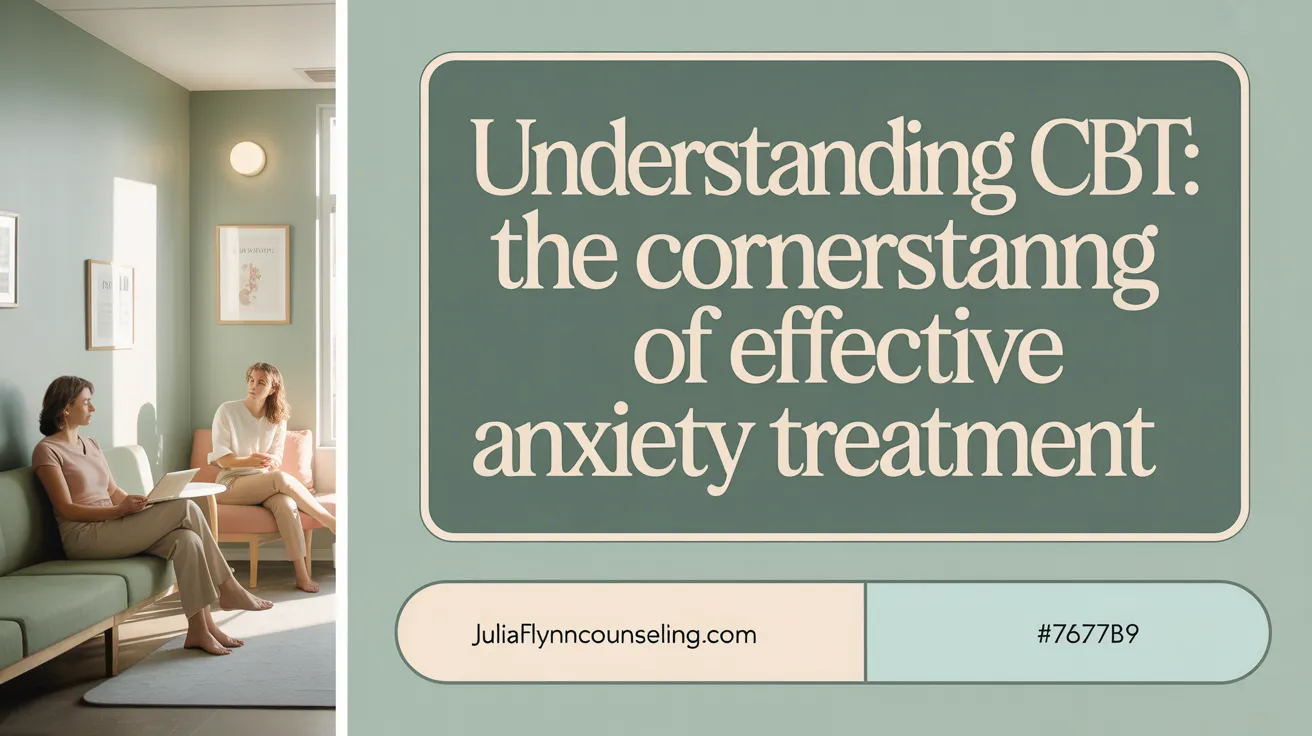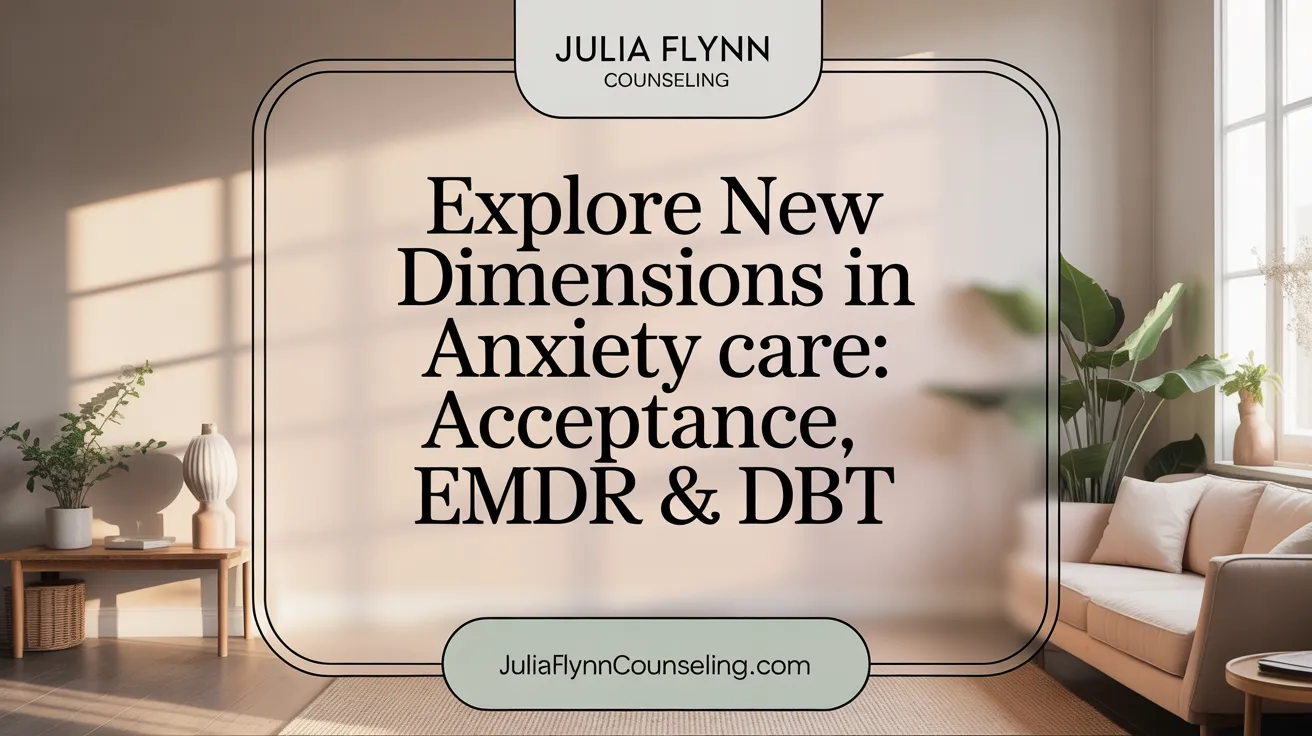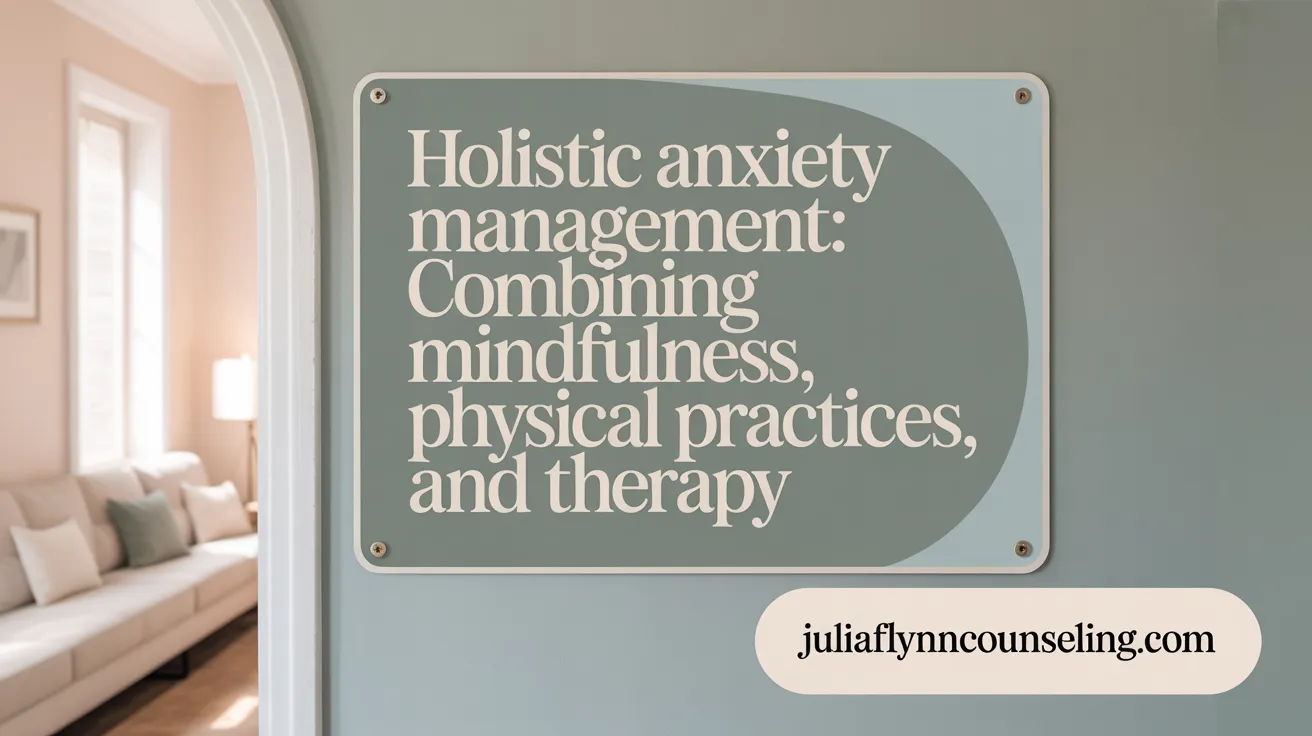Understanding Anxiety and Stress: The Need for Tailored Therapies
Anxiety and stress are pervasive challenges affecting millions worldwide, often disrupting daily functioning and quality of life. While these conditions share overlapping symptoms, their manifestations and triggers vary greatly among individuals. Consequently, therapy approaches must be customized to address unique needs and underlying causes effectively. This article explores a spectrum of tailored therapeutic strategies designed to combat anxiety and stress, highlighting evidence-based methods, integrative techniques, and emerging personalized care models that promise greater efficacy and holistic wellness.
Foundations of Cognitive Behavioral Therapy in Anxiety Treatment

What is the role of CBT in treating anxiety?
Cognitive Behavioral Therapy (CBT) for Anxiety stands as the foremost evidence-based treatment for anxiety disorders. It targets the negative thought patterns and behaviors that feed anxiety, combining cognitive therapy — which explores how thoughts shape feelings — with behavioral therapy that tackles reactions to anxiety-provoking situations.
Principles of CBT
At its core, Cognitive behavioral therapy (CBT) helps individuals understand that it is not external events, but their perceptions and thoughts about these events, that influence emotional responses. By identifying and thought challenging in CBT, CBT empowers patients to replace them with more realistic and positive ones, thus reducing anxiety symptoms.
Cognitive restructuring in anxiety
A foundational technique in CBT is cognitive restructuring techniques or thought challenging. This process involves recognizing irrational beliefs, examining the evidence supporting these thoughts, and reformulating them into balanced perspectives. This technique is effective across various anxiety disorders, mitigating overwhelming feelings.
Behavioral techniques and exposure therapy
Behavioral techniques in CBT encompass exposure therapy for anxiety, which systematically exposes individuals to feared stimuli in a controlled and gradual manner. Systematic desensitization technique enhances this by pairing exposure with relaxation strategies, building tolerance and diminishing fear responses over time.
How is exposure therapy integrated into CBT?
Exposure therapy for anxiety is integrated as a critical behavioral component within CBT. By gradually confronting fears, avoidance diminishes, and anxiety lessens. This method has proven effective for specific phobias, social anxiety disorder, generalized anxiety disorder, obsessive-compulsive disorder, and post-traumatic stress disorder.
Application across anxiety disorders
CBT protocols are tailored for different anxiety conditions. For example, social anxiety treatment focuses on exposure to social situations combined with cognitive restructuring, while OCD utilizes exposure with ritual prevention. Across disorders, CBT for PTSD and other anxiety disorders collaboratively equips individuals with skills to manage their anxiety and regain control over daily life.
Expanding Therapeutic Horizons: Acceptance, EMDR, and Dialectical Behavior Therapy

What alternative therapies complement or extend CBT for anxiety?
Several therapies beyond Cognitive Behavioral Therapy (CBT) for Anxiety provide valuable alternatives or complements in treating anxiety disorders.
Acceptance and Commitment Therapy (ACT) centers on accepting anxiety as a part of experience rather than trying to eliminate it. It incorporates mindfulness practices and encourages patients to act consistently with their personal values, enhancing psychological flexibility and quality of life.
Eye Movement Desensitization and Reprocessing (EMDR) therapy focuses on helping individuals process traumatic memories underlying certain anxiety symptoms. By using bilateral stimulation—such as guided eye movements—EMDR reduces the distress linked with traumatic events and is widely endorsed for trauma-related anxiety.
Dialectical Behavior Therapy (DBT) offers skills in mindfulness, distress tolerance, emotional regulation, and interpersonal effectiveness. These components are particularly helpful for individuals struggling with intense emotions and relationship challenges in the context of anxiety.
Internal Family Systems (IFS) therapy takes a unique approach by exploring the different 'parts' or subpersonalities within an individual that contribute to anxiety. This method is notably effective for high-functioning individuals whose anxiety may be driven by perfectionistic or critical internal voices.
Together, these therapies expand treatment options, addressing aspects of anxiety that CBT may not fully cover, thus offering a more holistic and personalized approach to anxiety management.
Integrative and Complementary Approaches Enhancing Anxiety and Stress Care

What integrative treatments support anxiety and stress management?
Integrative therapies play a valuable role alongside conventional treatments to help manage anxiety and stress effectively. They focus on cultivating emotional balance and relaxation, addressing both mind and body.
Mindfulness and Meditation
Mindfulness-based stress reduction (MBSR) and meditation practices emphasize present-moment awareness and non-judgmental acceptance of thoughts and feelings. These techniques reduce stress and anxiety symptoms and improve emotional resilience. Some studies even suggest that mindfulness approaches can be as effective as medication for managing anxiety.
Yoga, Tai Chi, and Qigong
Physical-mindfulness practices like yoga, Tai Chi, and Qigong combine gentle movement, breath control, and meditative focus. These practices promote relaxation, reduce muscle tension, and lower psychological distress. While research shows benefits particularly as complementary therapies, they are recognized for supporting overall mental well-being.
Biofeedback and Relaxation Techniques
Biofeedback and relaxation techniques for anxiety train individuals to gain awareness and control of physiological stress responses, such as heart rate variability. Progressive muscle relaxation helps alleviate muscle tension and promotes calm. These methods assist in managing physical manifestations of anxiety and enhancing self-regulation skills.
Acupuncture and Massage Therapy
Acupuncture for stress and anxiety relief, involving stimulation of specific points on the body with fine needles, may relieve anxiety symptoms and support better sleep. Massage therapy for anxiety and insomnia reduces stress-related conditions by decreasing muscle tension and promoting relaxation, with cumulative benefits noted through repeated sessions.
Integrative approaches are safe and often enhance the effects of primary therapies like cognitive behavioral therapy (CBT) for anxiety. They offer accessible, supportive tools for long-term anxiety and stress management.
Personalized and Precision Medicine in Anxiety Treatment

Treatment moderators and individualized care
Personalized treatment for anxiety disorders focuses on tailoring interventions based on individual patient characteristics such as symptom severity, comorbid emotional disorders, personality traits, and biological factors. Research on treatment moderators in anxiety disorders—factors that predict how well someone responds to specific treatments—has revealed few consistent predictors to guide care precisely. Methodological limitations and small study samples contribute to this challenge, making it difficult to effectively match patients with the most suitable therapies.
Machine learning in treatment prediction
Innovative uses of AI in personalized treatment for anxiety are beginning to transform how personalized treatment is approached. For example, studies analyzing dozens of baseline variables have identified key factors that predict recovery from generalized anxiety disorder over extended periods with notable accuracy. Variables such as education level, social support, emotional health, and healthcare usage have been flagged. These predictive models offer the potential to inform clinicians on which patients may benefit most from particular treatments, enabling more targeted, effective care plans.
Biomarkers and genetic profiling
Advances in precision medicine for anxiety disorders also contribute to precision medicine for anxiety. Blood-based gene expression profiles associated with anxiety states provide objective measures that may enhance diagnosis and treatment selection. Specific genes linked to neurotransmitter regulation and brain function have been identified, some of which are targets of existing medications. This knowledge paves the way for biomarker-guided therapy optimization and drug repurposing tailored to an individual's biological makeup.
Challenges and future directions
Despite promising developments, the field faces hurdles including verifying biomarkers across diverse populations, refining machine learning algorithms, and conducting large-scale studies with rigorous methods. Future research aims to enhance the precision of anxiety disorder diagnostics and personalize treatments effectively, potentially improving outcomes for many patients. Integrating multidimensional data—clinical, biological, and psychosocial—will be crucial for the advancement of precision medicine for anxiety disorders.
Innovations in Therapy Delivery: Technology and Accessibility
What technological innovations are enhancing anxiety therapy?
Technology is revolutionizing how anxiety therapy is delivered, making treatments more accessible and often more effective. A major innovation is Internet-delivered Cognitive Behavioral Therapy (I-CBT), which offers structured, evidence-based therapy remotely. Studies show that I-CBT can yield outcomes comparable to traditional face-to-face sessions, expanding access especially for those in remote or underserved areas.
Another cutting-edge development is Virtual Reality Exposure Therapy (VRET). This immersive technology simulates feared situations—such as flying, public speaking, or heights—in a safe, controlled environment. VRET enhances exposure therapy by enabling clients to habituate to anxiety-provoking stimuli gradually, which can be difficult to reproduce reliably in real life.
Ecological momentary interventions (EMIs) are mobile-based therapies that deliver real-time coping strategies via phone apps or text messages. This supports clients in managing anxiety symptoms promptly as they occur in their daily lives, bridging gaps between therapy sessions.
Furthermore, telehealth platforms enable flexible scheduling and therapy delivery via video calls. This approach accommodates busy professionals and those with mobility or transportation challenges, providing convenience without sacrificing personalized care. For more information, see Anxiety Therapy for High-Achieving Professionals.
Combined, these technological advances are enhancing how anxiety therapy is accessed and experienced, promoting wider reach and sustained engagement.
Developing Comprehensive, Tailored Anxiety Treatment Plans
What components make an effective tailored anxiety treatment plan?
An effective anxiety treatment plan starts with a detailed assessment and diagnosis. This step identifies individual symptoms, anxiety triggers, co-occurring conditions, and personal challenges. Understanding these factors allows clinicians to build a personalized anxiety care at Apex Psychiatry.
Personalized goals are set collaboratively between patient and therapist, focusing on symptom reduction, improved daily functioning, and enhanced coping skills. These goals guide the selection of interventions.
Multimodal interventions are central to tailored plans. Cognitive Behavioral Therapy (CBT) for Anxiety and Exposure Therapy for Anxiety are primary evidence-based treatments, helping modify negative thought patterns and gradually reduce avoidance behaviors. Acceptance and Commitment Therapy (ACT) and mindfulness practices are often incorporated to promote psychological flexibility and stress management. Complementary strategies such as relaxation techniques for anxiety, lifestyle changes (e.g., exercise, sleep hygiene), and medication may also be included as needed.
Ongoing evaluation is crucial; treatment plans are regularly reviewed to assess progress and adapt strategies. This dynamic process ensures that therapy remains effective and responsive to changing needs.
Overall, comprehensive personalized treatment for anxiety disorders optimize recovery by addressing unique patient experiences and integrating multiple therapeutic approaches for best outcomes.
Addressing Stress with Targeted Therapeutic Techniques
How are stress and its effects managed through therapy?
Stress therapy focuses on reducing symptoms and improving coping skills through several therapeutic approaches. Cognitive Behavioral Therapy (CBT) helps individuals identify and modify negative thought patterns and behaviors that contribute to stress. Mindfulness-based therapies, such as Mindfulness-Based Cognitive Therapy (MBCT) and Mindfulness-Based Stress Reduction (MBSR), promote present-moment awareness and emotional resilience, easing the impact of stress.
Psychodynamic therapy addresses underlying emotional conflicts that may be fueling ongoing stress, enhancing self-awareness and insight. Group therapy supports individuals facing significant stressors by providing social connection, shared experiences, and collective coping mechanisms.
Complementing these psychological therapies, relaxation techniques like deep breathing exercises, meditation, yoga, and massage therapy help manage the physical and emotional symptoms of stress. These techniques stimulate the body's relaxation response, reducing muscle tension and calming the mind. Relaxation techniques are detailed in sources like Stress therapy techniques and Relaxation techniques for anxiety and stress.
Lifestyle interventions, including regular physical activity, balanced nutrition, sufficient sleep, and maintaining social connections, play an essential role in holistic stress management. Establishing routines for self-care and engaging in enjoyable activities help build emotional strength and resilience against stressors. These elements are discussed in Stress management and emotional health and Physical activity for stress relief.
Together, these targeted therapies and interventions provide an integrative approach to effectively manage stress and improve overall well-being.
Lifestyle and Supportive Strategies as Integral Parts of Therapy
What lifestyle modifications support anxiety and stress treatment?
Lifestyle changes are essential components of effective therapy for stress and therapy for anxiety disorders.
Physical activity, such as walking, swimming, or jogging, releases endorphins that help reduce emotional intensity and improve mood. A healthy diet rich in fruits, vegetables, lean proteins, and whole grains supports overall mental and physical well-being (healthy diet tips for managing stress).
Good sleep hygiene is vital; adults ideally get seven or more hours of sleep to help regulate mood and cognitive functions. Avoiding substances like alcohol, caffeine, and tobacco can prevent exacerbation of anxiety and stress symptoms (lifestyle changes to reduce anxiety).
Maintaining social connections through friends, family, or support groups offers valuable emotional encouragement and reduces feelings of isolation. Support groups provide shared understanding and practical coping strategies (maintaining social connections).
Self-care activities and stress reduction techniques—including mindfulness meditation, journaling, relaxation exercises, and effective time management—enhance daily resilience and emotional balance. These strategies complement therapy by helping individuals manage stressors and foster a healthier lifestyle (stress management techniques, integrative treatments for stress).
Together, these lifestyle and supportive measures create a robust foundation that enhances the effectiveness of therapeutic interventions for anxiety and stress.
Long-Term Benefits and Commitment in Tailored Anxiety and Stress Therapies

Therapy Duration and Perseverance
Therapy for anxiety disorders and stress typically spans about 8 to 16 sessions, offering meaningful improvements with persistence. Many patients experience significant relief within this timeframe, but sustained commitment is crucial. Results develop gradually, and adherence to therapeutic exercises outside sessions enhances effectiveness.
Facing Fears vs. Avoidance
A central challenge in anxiety treatment is embracing fears rather than avoiding them. Exposure therapy for anxiety guides individuals to systematically confront anxiety triggers, which may increase discomfort initially. However, this deliberate facing of fears leads to extinction of anxiety responses and long-term symptom reduction.
Improved Coping and Quality of Life
Through Cognitive Behavioral Therapy (CBT) for anxiety, therapy strengthens coping strategies. This improvement fosters better emotional regulation, enabling enhanced social interactions and workplace functioning. Patients often report greater life satisfaction and reduced emotional volatility after therapy.
Physical and Relational Health Improvements
Beyond psychological effects, anxiety and stress therapy contribute to physical health benefits such as lowered blood pressure and reduced risk of stress-related illnesses. Strengthened relationships, supported by improved communication and emotional awareness, further enhance overall well-being. Combining therapy with healthy lifestyle and social connections for anxiety management sustains these gains.
Ongoing practice and integration of therapeutic strategies support resilience and emotional stability, emphasizing that long-term success in managing anxiety and stress involves both the structured therapy period and continual self-care.
The Path Forward: Embracing Personalized and Integrated Care
Anxiety and stress demand nuanced understanding and individualized treatment strategies to achieve meaningful recovery and resilience. Cognitive Behavioral Therapy remains the cornerstone of effective care, augmented by innovative approaches such as Acceptance and Commitment Therapy, EMDR, and technological advancements like virtual reality exposure. Integrative therapies, lifestyle modifications, and supportive structures enrich treatment efficacy, emphasizing the importance of holistic care. Future advances in precision medicine promise even greater personalization, leveraging biomarkers and predictive algorithms to tailor therapy to each individual's unique profile. With ongoing commitment and comprehensive, tailored intervention plans, individuals facing anxiety and stress can look forward to improved emotional health, functional well-being, and enhanced quality of life.
